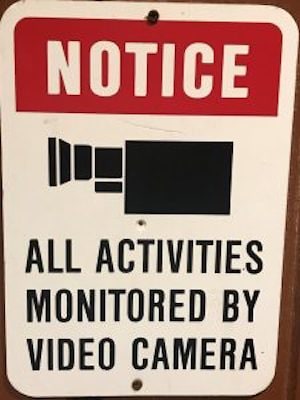Since 1993
Ring Doorbell Wars and the “Privacy Interception” Trap in Orlando

By: John Guidry
If you’re a rude person, there are all sorts of ways to express yourself. In a similar vein, if you want to escalate the tension of a situation, there are all sorts of ways to transform a minor moment into a bigger deal than it really is.
One way to spice things up? Put a phone—or a permanent camera—in someone’s personal space.
“I’m recording you! Say it again, I dare you.”
Welcome to the future. We have a Right to Privacy, but as we move through 2025, technology is creating privacy violations that the writers of the Constitution never could have contemplated. Even doorbells are now legal battlegrounds.
Caught on a neighbor’s camera or a secret recording in Orlando? Whether it’s a “Wiretap” or “Digital Voyeurism,” your privacy isn’t just a suggestion—it’s the law. Call John Guidry today at (407) 423-1117.
The Neighbors’ Ring: A Window into Your Home?
Take the case of my old client in the escort business. Her neighbor across the hall installed a Ring doorbell that captures every motion. Because her condo is only a few feet away, the camera records the interior of her home every time she opens the door.
In 2025, Florida law on this is clear but tricky. As an Orlando defense expert, I always tell people: “It depends.”
- Video in the Hallway: Generally, there is no reasonable expectation of privacy in a shared apartment or condo hallway. It’s a common area.
- Peering Inside: This is where it gets “insane.” Under the recent logic of Jackman v. Cebrink-Swartz (Fla. 2d DCA), if a camera is positioned to peer into a neighbor’s private dwelling—where they do have an expectation of privacy—it can constitute Intrusion upon Seclusion.
- The Threat to Disclose: If that neighbor is threatening to “expose” those videos, we aren’t just talking about privacy anymore; we might be looking at Extortion or Stalking.
Audio: The Felony “Wiretap” Trap
Florida is an all-party consent state under Florida Statute § 934.03. This means you cannot record a private conversation unless everyone agrees.
If that Ring doorbell is picking up audio of private conversations happening inside my client’s home or at her doorstep where she expects privacy, that neighbor could be committing a third-degree felony.
The “Smiley” Standard: If You See the Camera, Do You Lose Your Rights?
In Smiley v. State, 279 So. 3d 262 (Fla. 1st DCA 2019), a man was recorded by his girlfriend while they argued. He knew she was holding the phone, and he even tried to take it. The court ruled the recording was legal because:
- Subjective Expectation: He knew he was being recorded, so he couldn’t claim he expected it to be private.
- The Trespasser Rule: He had been told to leave nine times. As the court noted, “trespassers do not have a reasonable expectation of privacy.”
The Scary Reality: This case suggests that if someone puts a phone in your face, and you know it’s there, the law might argue you’ve lost your right to stay silent. This is a “sad but true” trend where the mere presence of technology is being used to shatter our Fourth Amendment protections.
John’s Takeaways for 2025
- Hallway vs. Home: You don’t have a right to privacy in the hallway, but you do have a right to the privacy of your home’s interior. If a neighbor’s camera “peeks” inside, that’s a violation.
- Audio is the “Red Line”: Most people forget that Ring doorbells record audio by default. Recording a neighbor’s private chat without their consent is a felony in Florida.
- Digital Voyeurism (F.S. § 810.145): In 2025, if someone uses an imaging device to secretly record you in a state of undress (even through an open door), they are crossing into serious criminal territory.
- The “Invited Guest” Defense: If you were invited over, like Smiley originally was, you have a higher expectation of privacy than a “prowler” or a “trespasser.”
- Failure of Proof: If the recording was obtained in violation of Chapter 934, it is inadmissible. I will file a Motion to Suppress faster than that neighbor can hit “upload.”
The justice system is harsh, and it’s “insane” how a simple doorbell can turn into a criminal investigation. I’ve been defending Central Florida residents against “Big Brother” tactics since 1993. Whether it’s a neighbor spying on you or a “blabbing” recording being used in court, don’t let the technology take your rights away.
Recorded without your consent? Call John at (407) 423-1117.

About John Guidry II
John Guidry II is a seasoned criminal defense attorney and founder of the Law Firm of John P. Guidry II, P.A., located in downtown Orlando next to the Orange County Courthouse, where he has practiced for over 30 years. With more than three decades of experience defending clients throughout Central Florida since 1993, Guidry has successfully defended thousands of cases in Orange, Seminole, Osceola, Brevard, Lake, and Volusia counties. He has built a reputation for his strategic approach to criminal defense, focusing on pretrial motions and case dismissals rather than jury trials.
Guidry earned both his Juris Doctorate and Master of Business Administration from St. Louis University in 1993. He is a member of the Florida Bar and the Florida Association of Criminal Defense Lawyers. His practice encompasses the full spectrum of Florida state criminal charges, with a particular emphasis on achieving favorable outcomes through thorough pretrial preparation and motion practice.
Beyond the courtroom, Guidry is a prolific legal educator who has authored over 400 articles on criminal defense topics. He shares his legal expertise through his popular YouTube channel, Instagram, and TikTok accounts, where he has built a substantial following of people eager to learn about the law. His educational content breaks down complex legal concepts into accessible information for the general public.
When not practicing law, Guidry enjoys tennis and pickleball, and loves to travel. Drawing from his background as a former recording studio owner and music video producer in the Orlando area, he brings a creative perspective to his legal practice and continues to apply his passion for video production to his educational content.








